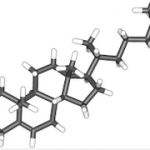 In 1987, Mevacor (lovastatin) became the first member of a new class of drugs that were effective in reducing serum cholesterol. These drugs were named statins, and they would later become the standard-of-care treatment for lowering LDL (bad) cholesterol one of the factors that contributes to cardiovascular disease. Prior to that, there were two alternatives, both bad.
In 1987, Mevacor (lovastatin) became the first member of a new class of drugs that were effective in reducing serum cholesterol. These drugs were named statins, and they would later become the standard-of-care treatment for lowering LDL (bad) cholesterol one of the factors that contributes to cardiovascular disease. Prior to that, there were two alternatives, both bad.
There have been a number of failed attempts (in the case of Pfizer, a spectacular failure) to reduce atherosclerosis by other mechanisms, statins drugs are still the standard therapy for treatment and prevention of heart attacks and strokes.
Statins act by blocking one step in the biosynthesis of cholesterol in the liver where cholesterol is made in the body. They inhibit the enzyme (HMG-CoA reductase) that converts hydroxymethylglutarate into mevalonic acid, thereby short-circuiting one of the steps that is required by the liver to make cholesterol.
But now, an immune-based approach that is completely different from the statin mode of action, may be an alternative way to prevent cardiovascular events. Not by inhibiting the production of cholesterol, but by preventing the release of LDL cholesterol the real culprit. This could end up being superior to the mode of action by which statins function.
The new target a protein which has the convenient name proprotein convertase subtilisin/kexin type 9, aka PCSK9 (and good luck using this in Scrabble) does something very different. LDL receptors on liver cells play a part in regulation of cholesterol levels in the blood by binding to, LDL particles and bringing them into the cell. But, a protein called PCSK9 is also circulating in blood, and it is also capable of binding to the same receptor and degrades it. As a result, fewer LDL receptors are available to remove LDL from the blood.
So, when something ties up PCSK9, the LDL receptors remain intact, and they continue to do their job in soaking up LDL. This is the basis of the cardioprotective properties of PCSK9 inhibitors.
Amgen and Sanofi have have developed antibodies that bind strongly to PCSK9. Amgen s drug is called evolocumab while Sanofi s is called alirocumab. (Note: All antibody names end with umab). Both companies have filed new drug applications with the FDA. A decision is expected this summer.
The results of the study show just how promising this new drug just might be. In a review of 24 randomized controlled studies on patients with elevated cholesterol levels, the researchers noted that compared to no treatment with PCSK9, treatment with the new drug was associated with lower mortality and lower incidence of myocardial infarction. The patients taking the drug also exhibited lowered levels of LDL-cholesterol and lipoprotein. These results coupled with the fact the drug was reportedly well tolerated by patients suggests that the drug is both safe and effective for treating people with dyslipidemia.
ACSH s Dr. Gil Ross had this comment: Let s start with the downsides of this meta-analysis: as with any such collective evaluation, some of the trials reported on are not of the highest quality. The duration of treatment varied. The total number of outcomes was small: indeed, the total number of all-cause mortality events deaths, that is was 40, a smallish number upon which to construct a paradigm shift in cholesterol treatment.
I feel that these concerns, while real, are outweighed by an order of magnitude by the degree of benefit discerned among the 10,000+ patients evaluated in the 24 RCTs selected. When weighed against numbers like a 47 percent reduction in LDL-cholesterol, a 55 percent lowering of all-cause mortality, and a reduction by one-half in both cardiovascular death and heart attack (myocardial infarction), the least that can be said about this new frontier in CV prevention is that these results are exciting, and certainly more RCTs with specific endpoints and time-frames should be done. I hope they re being done as we speak. (Also note the lack of significant uptick in adverse drug effects). Stay tuned to PCSK9s, folks--you re in for a bumpy but thrilling ride.


